 Petzlover
Petzlover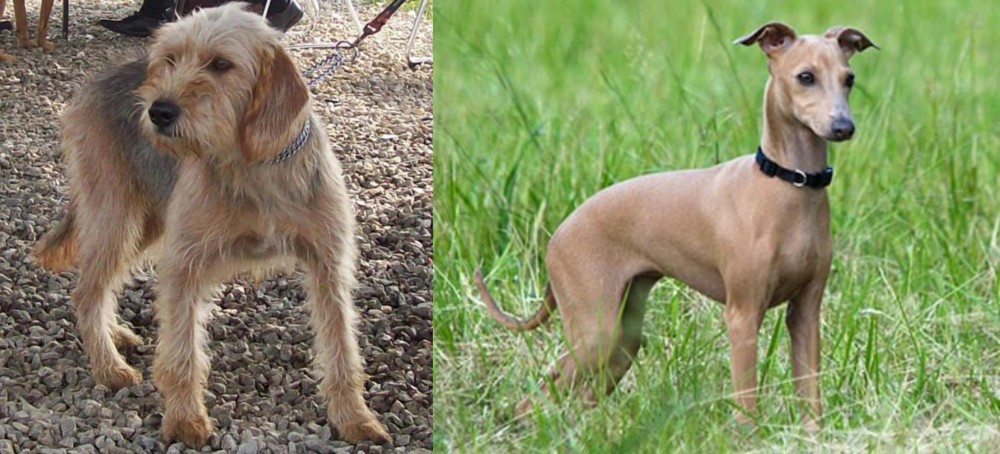 Bosnian Coarse-Haired Hound is originated from Bosnia and Herzegovina but Italian Greyhound is originated from Italy. Bosnian Coarse-Haired Hound may grow 17 cm / 7 inches higher than Italian Greyhound. Bosnian Coarse-Haired Hound may weigh 17 kg / 38 pounds more than Italian Greyhound. Both Bosnian Coarse-Haired Hound and Italian Greyhound has same life span. Bosnian Coarse-Haired Hound may have more litter size than Italian Greyhound. Bosnian Coarse-Haired Hound requires Moderate Maintenance. But Italian Greyhound requires Low Maintenance
Bosnian Coarse-Haired Hound is originated from Bosnia and Herzegovina but Italian Greyhound is originated from Italy. Bosnian Coarse-Haired Hound may grow 17 cm / 7 inches higher than Italian Greyhound. Bosnian Coarse-Haired Hound may weigh 17 kg / 38 pounds more than Italian Greyhound. Both Bosnian Coarse-Haired Hound and Italian Greyhound has same life span. Bosnian Coarse-Haired Hound may have more litter size than Italian Greyhound. Bosnian Coarse-Haired Hound requires Moderate Maintenance. But Italian Greyhound requires Low Maintenance
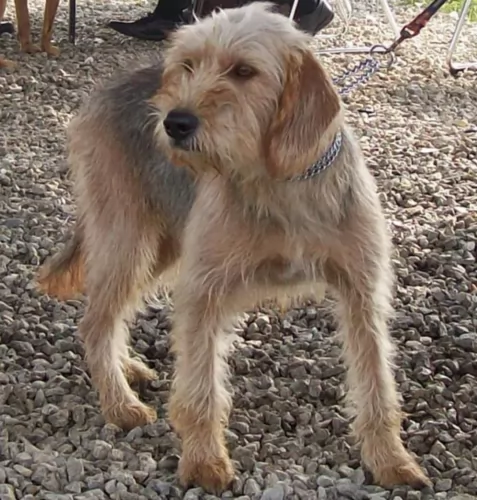 Once known as the Illyrian Hound and also known also as the Barak, the Bosnian Coarse-haired Hound was developed in Bosnia, and as a scenthound, it would hunt large game. Barak belongs to the hound group so typically this dog wants to chase wild game which he used to do long ago for his master.
Once known as the Illyrian Hound and also known also as the Barak, the Bosnian Coarse-haired Hound was developed in Bosnia, and as a scenthound, it would hunt large game. Barak belongs to the hound group so typically this dog wants to chase wild game which he used to do long ago for his master.
The breed was developed into what is's current looks are. In the 1890’s he was crossed with Italian gun dogs with local scent hound stock. It is a rare breed, and outside of Bosnia and Herzegovina, it is all but unknown.The dog is also known as the Bosnian-Rough-Coated Hound or the Illyrian Hound. In 2006 the breed was recognized by the United Kennel Club as the Barak in the Scenthound group. Unfortunately, while the Bosnian Coarse-Haired Hound is still found in Bosnia, there is plenty of conflict in the country, and the future of the dog is unknown.
 The Italian Greyhound is an ancient breed, a purebred originating in Italy but with evidence to suggest it was also to be found in Turkey and Greece.
The Italian Greyhound is an ancient breed, a purebred originating in Italy but with evidence to suggest it was also to be found in Turkey and Greece.
It's a small breed dog that became popular with Italian royalty in the 16th century. Over the centuries, the dog's appearance has remain unchanged, although breeders tried to make it even smaller, leading to problems with the health of the dog.
Towards the end of the 1800s, it was fortunate that breed fanciers implemented breeding programs to restore the dog's look's and strength. The American Kennel Club registered the Italian Greyhound in 1886. Today the dog is a wonderful companion dog.
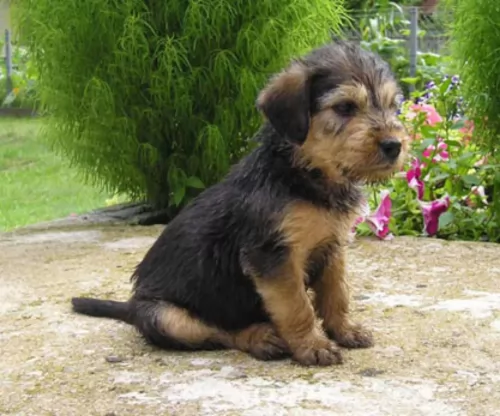 The medium to large sized dog is known for his coarse, shaggy coat of wheaten, black, red or grey shades. Some dogs are bi- or tri-colored. The shaggy coat has a thick undercoat and this is what provides insulation for the dog to cope in extremely cold weather conditions. He is a moderate shedder and he will need to be brushed thoroughly twice a week to remove his loose hairs.
The medium to large sized dog is known for his coarse, shaggy coat of wheaten, black, red or grey shades. Some dogs are bi- or tri-colored. The shaggy coat has a thick undercoat and this is what provides insulation for the dog to cope in extremely cold weather conditions. He is a moderate shedder and he will need to be brushed thoroughly twice a week to remove his loose hairs.
Some dogs have white marks on the head. The height of this dog ranges between 46–55cm at the withers and he can weigh in at between 16–24kg. He is well known for his facial hair – a moustache and beard on the muzzle with large, brown eyes and an intelligent, alert and playful expression.The Bosnian Coarse Haired Hound is a robust dog with a deep chest that provides him with a well proportioned appearance. The brown eyes have bushy eyebrows, the ears fairly long and floppy and the tail long and somewhat feathery.
The Bosnian Coarse-haired Hound makes an exceptional pet because he is loyal and friendly with his family members and patient and tolerant of children’s antics. He also gets on well with other pets in the house.
 The sweet Italian Greyhound is much like the regular Greyhound, just smaller but every bit as sleek, elegant and fine-boned. He stands at between 33 and 38cm at the withers and weighs just 3 to 7kg. He is slender and elegant.
The sweet Italian Greyhound is much like the regular Greyhound, just smaller but every bit as sleek, elegant and fine-boned. He stands at between 33 and 38cm at the withers and weighs just 3 to 7kg. He is slender and elegant.
He has long, fine-boned legs and his short, smooth coat makes him easy to groom too. The coat comes in a number of colors such as fawn, tan, grey, reddish, chocolate and black.
Described as sweet, intelligent and playful, the Italian Greyhound adapts easily to life in the city or to country life.
He is easy to train too, and even though he is small and amicable, it is still a good idea to have him trained and socialized as he is just a simple pleasure to have around then. He just loves the company of his human family and becomes a gentle friend to other dogs, to children in the home and to the elderly.
He is a frail toy dog, and he needs to be constantly watched over that he isn’t handled roughly by disrespectful children or from bigger pets. He is an active breed and will love to be played with and join you on your walks. Even though he is such a frail, fragile looking dog, he has a feisty, stubborn, defiant side to him and that is why training and socialization becomes important. He will be reserved around strangers.
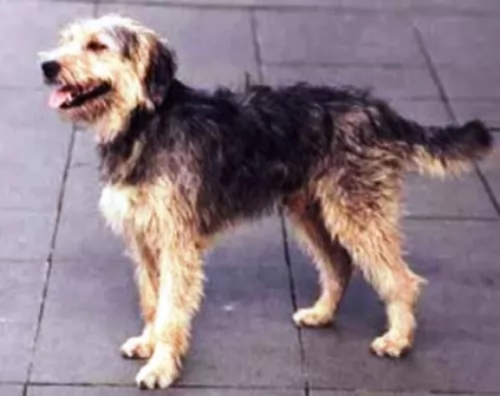 Bosnian Coarse-Haired Hounds are loyal, loving dogs. They are intelligent too and easy to train. With training and socialization, they are well behaved and a pleasure to have in the home. He makes an excellent pet for any family who bears in mind that he needs lots of exercise. When he uses up his energy with games, walks and other activities, he becomes a playful friend with children in the house.
Bosnian Coarse-Haired Hounds are loyal, loving dogs. They are intelligent too and easy to train. With training and socialization, they are well behaved and a pleasure to have in the home. He makes an excellent pet for any family who bears in mind that he needs lots of exercise. When he uses up his energy with games, walks and other activities, he becomes a playful friend with children in the house.
His temperament fits his tousled looks and he is outgoing, amicable, social and friendly. He wants to be a member of the family and to be part of all the activities going on. When he is happy and well cared for, he makes a splendid pet.
 If you’re looking for a sweet, gentle canine friend, the Italian Greyhound promises to be just that. They just crave human companionship and are eager to please.
If you’re looking for a sweet, gentle canine friend, the Italian Greyhound promises to be just that. They just crave human companionship and are eager to please.
He isn’t the ideal playmate for children, simply because he is frail and can get hurt easily in rough play.
Small he may be, but he is intelligent and alert, and he will bark to warn you of strangers. They are essentially indoor dogs, and when you bring one of them into your home, you’ll be rewarded with a devoted, loving and loyal canine friend.
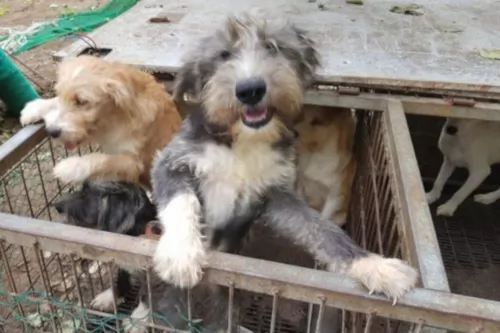 The Bosnian Coarse-Haired Hound is a generally healthy breed, but just like with other dogs, he can also be prone to some hereditary health issues.
The Bosnian Coarse-Haired Hound is a generally healthy breed, but just like with other dogs, he can also be prone to some hereditary health issues.
This is essentially a kind of degenerative arthritis and can be painful for your pet. You’ll notice that he battles to get up after lying down. There are some treatment options that can alleviate his pain and make him more comfortable, but there is no cure.
It is essentially where the dog’s hips partially dislocate and it is a genetic condition. It is more usual in larger dogs but any dogs can battle with hip dysplasia.
This occurs when your dog’s kneecap is dislocated. It can be a genetic malformation or trauma. A dislocated kneecap is a common knee joint abnormality and a dog with a dislocated kneecap will have abnormal hind-limb movement, occasional skipping and even lameness.
 Your small Italian Greyhound isn’t a sickly dog breed, and in fact, with the right care, he can live to be between 10 to 14 years of age.
Your small Italian Greyhound isn’t a sickly dog breed, and in fact, with the right care, he can live to be between 10 to 14 years of age.
As with any dog breed however, there will be some more common conditions to watch for in the Italian Greyhound. Some of these are epilepsy, hyperthyroidism and periodontal disease.
There are different types and causes of seizures, and there are actually no definitive tests for epilepsy. One seizure isn’t enough to make a diagnosis and more than one seizure is usually recorded before a diagnosis can be made and treatment prescribed.
These treatments don’t cure Epilepsy but rather control the symptoms and keep the dog seizure-free so that they can have a normal life.
Seizures are not all the same – some are life-threatening and advice from the internet can’t be looked upon as adequate. With a dangerous disease such as epilepsy, excellent and qualified veterinary help will be required.
Gum disease can be terrible for your pet. Apart from bone loss and loss of teeth, your pet will experience pain. Periodontal disease may well be common in dogs, but it can be prevented.
Once an animal has eaten food, particles of food, saliva and bacteria form plaque over the teeth and this doesn’t only cause damage to the teeth but to the entire immune system.
This disease can cause inflamed gums and loss of teeth. It is important to brush your pet’s teeth with special canine toothbrush and toothpaste.
The truth is, periodontal disease can cause more problems than just tooth pain which is bad enough. Dogs with gum inflammation may be at higher risk for heart- and kidney disease too. If you’re worried about your dog, take him in to your vet for an oral examination and teeth cleaning.
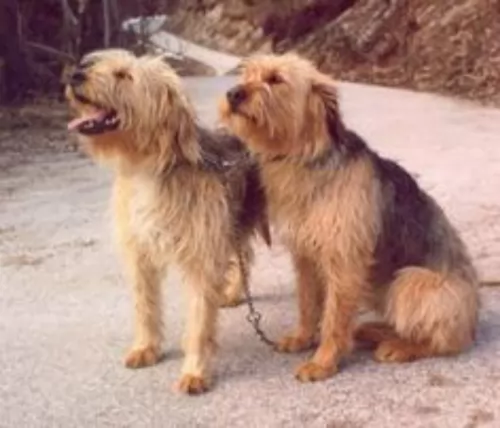 This bearded dog is energetic so he will need to be exercised by you. You can take him on walks or take him to the park or play ball games with him. He will be prone to excessive barking and other kinds of destructive behavior through no fault of his own if you buy a pet like this and just plonk him in your back garden. He wants to be a part of your family and exercising him daily is part of owning a pet like the Bosnian Coarse Haired Hound.
This bearded dog is energetic so he will need to be exercised by you. You can take him on walks or take him to the park or play ball games with him. He will be prone to excessive barking and other kinds of destructive behavior through no fault of his own if you buy a pet like this and just plonk him in your back garden. He wants to be a part of your family and exercising him daily is part of owning a pet like the Bosnian Coarse Haired Hound.
The Bosnian Coarse Haired Hound is a strong-willed dog and intelligent too. Train him and socialize him because then he becomes such an obedient, amicable pet who just wants to please.
Your Barak is an energetic breed so he will need top quality food packed with vitamins and minerals that can provide him with the energy he needs. When it comes to feeding your Bosnian Coarse Haired Hound, store-bought dog food comes in a dry form or wet canned form.
If you’re unfamiliar with these foods, you can also speak to your veterinarian about the best food for your pet. Many dogs are lucky because their owners provide homemade diets – raw or cooked meat, vegetables and rice. A good multivitamin with omega 3 is also recommended for your pet as this can ensure his coat is shiny and his eyes bright and alert. Fresh, cool water must be within reach day and night.
 The Italian Greyhound has a short, smooth, satin-type coat which is easy to maintain. Gently brush him once or twice a week, being careful not to press down hard as he has frail, bambi-like legs.
The Italian Greyhound has a short, smooth, satin-type coat which is easy to maintain. Gently brush him once or twice a week, being careful not to press down hard as he has frail, bambi-like legs.
He also sheds little, making him a low maintenance breed. Because of the short coat, take particular care of him in the Winter and don’t allow him to become overly cold.
Your Italian Greyhound will require a diet rich in nutritional value, and if your particular dog is quite active you will need to feed him about 450 calories a day and sometimes more.
Each dog is an individual and will have different dietary needs. If you feed your pet a top quality commercially manufactured food, read the packaging for guidance on food portion sizes.
Speak to your vet if you are unsure how to feed your dog so that his food and the amounts you feed him contribute to his good health. He must always have access to fresh, cool water.